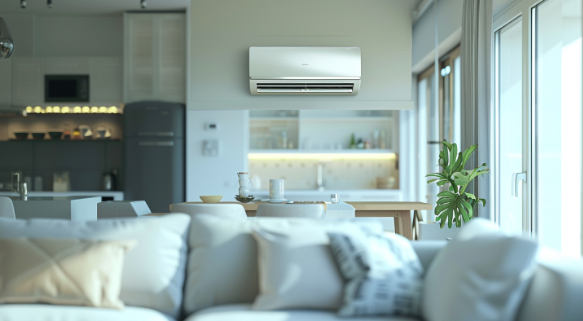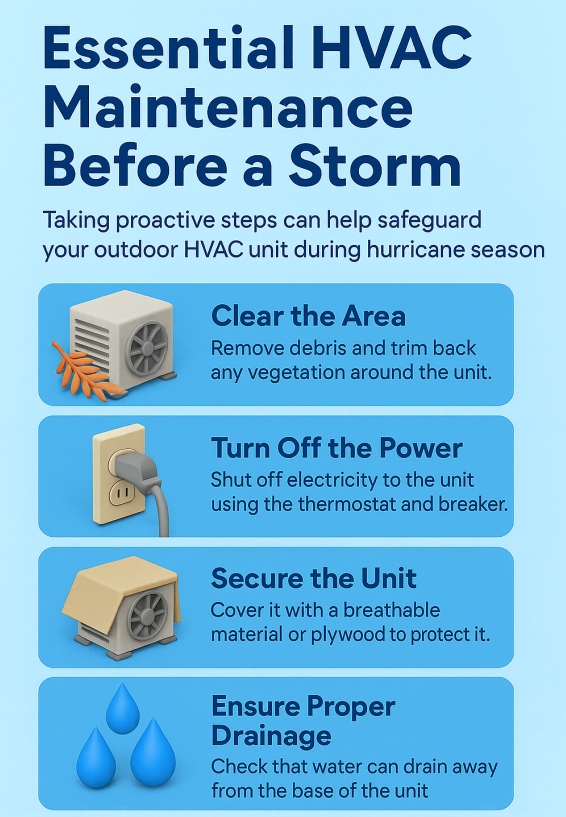Hurricane Season in Eustis: Essential HVAC Maintenance in Eustis to Protect Your Outdoor Unit Before a Storm
After years of helping homeowners across Florida replace storm-damaged HVAC filters and equipment, we’ve seen one pattern repeat itself every hurricane season in Eustis: most people don’t realize how vulnerable their outdoor HVAC unit is until it’s too late. Wind-driven debris, sudden pressure changes, and even minor flooding can turn a working system into a costly repair overnight.
At Filterbuy, we’ve spent more than a decade manufacturing filters, talking with technicians, and guiding families through pre-storm prep. Based on what we’ve learned firsthand, there are a few simple HVAC maintenance steps in Eustis that offer the biggest protection—yet many homeowners skip them because they’re rarely explained clearly.
If you’re searching for exactly what to do before a storm hits, this guide walks you through the proven, field-tested steps we recommend to keep your outdoor HVAC unit safer, minimize damage, and help your system bounce back quickly once the skies clear. Here’s how to get your Eustis home ready for hurricane season—without guesswork.
Quick Answers
Hurricane Season in Eustis: Essential HVAC Maintenance in Eustis to Protect Your Outdoor Unit Before a Storm
Shut off power at the thermostat and breaker before the storm.
Use a breathable cover or secured plywood to protect the fan.
Ensure drainage around the unit is clear to prevent flooding.
After the storm, inspect for dents, debris, or unusual noises before restarting.
Why it matters: These simple steps—based on what we see most often after storms—help protect your HVAC system from the debris, flooding, and power issues that commonly cause costly damage in Eustis during hurricane season.
Top Takeaways
Your outdoor HVAC unit is highly vulnerable during hurricanes.
Simple pre-storm steps offer major protection.
FEMA and NOAA data show rising storm risks and damage costs.
Homeowners who prepare early see fewer failures and faster recovery.
Protecting your HVAC system protects comfort, budget, and peace of mind.
Why You Should Really Care for Your Outdoor HVAC Unit Before a Storm
Outdoor HVAC units in Eustis are weatherized for typical Florida weather, but not for a hurricane. What the high wind can do is throw branches, roof shingles, and yard debris right at the unit. What heavy rain can do is close the drainage areas. And just a lightning strike can make the system very hot, even if the storm is not fully there yet. Simply by doing a few maintenance tasks, you can lower the chance of damage caused by the storm and also help your system be able to work faster once the storm is gone.
Clear the Area Around the Unit
Remove loose items, trim nearby branches, and clear out leaves or debris. Based on what we see after storms, most damage starts when unsecured objects become airborne and hit the HVAC cabinet or fan.
Secure the Unit and Shut It Down
If your unit isn’t already bolted to a concrete pad, consider adding hurricane straps or tie-downs. When the storm is close, turn the system off at the thermostat and the breaker to protect the electrical components from power surges or rapid pressure changes.
Protect the Top Without Blocking Airflow
Use a breathable, manufacturer-approved cover or a piece of plywood secured above the unit. This helps shield the fan from falling debris without trapping moisture—something we’ve seen lead to corrosion when homeowners use plastic tarps.
Prevent Flooding Around the Unit
Check that the area around your HVAC unit has clear drainage. Standing water can damage electrical parts and shorten your system’s lifespan. If your yard floods easily, consider temporary sandbags to divert water.
Inspect and Replace Filters Before the Storm
A clean filter helps your system run smoothly during pre-storm temperature swings and makes post-storm recovery easier. FilterBuy’s experience with thousands of Florida customers shows that systems with fresh filters bounce back noticeably faster.
Schedule a Post-Storm Inspection
Once conditions are safe, visually inspect the unit for dents, loose panels, or debris trapped in the fan blades. If something looks off—or if your system is making unusual noises—call a licensed HVAC technician before restarting it.

“After manufacturing filters for over a decade and helping thousands of Florida homeowners recover from storm damage, we’ve learned that protecting your outdoor HVAC unit isn’t about complicated fixes—it’s about taking the right steps before the first wind gust hits. The smallest preparations, like clearing debris and shutting the system down properly, consistently make the biggest difference in how well a unit survives a hurricane.”
Essential Resources for Hurricane-Ready HVAC Maintenance in Eustis
Florida-Tested HVAC Storm Prep Tips Every Home Needs
Resource: Hurricane AC Tips for Florida Homeowners – flairhvac.com
When storms threaten, the small things around your outdoor unit matter most. This Florida-focused guide breaks down simple, high-impact steps homeowners can take to protect their HVAC system before heavy winds arrive.
URL: https://www.flairhvac.com/hurricane-ac-tips/
A No-Guesswork Checklist to Prep Your AC Before a Hurricane
Resource: 7 Ways to Prepare Your AC for Florida Hurricane Season – airatyourdoorfl.com
If you want a quick, clear plan before a storm hits, this checklist covers the basics—from clearing debris to turning your system off safely. It’s straightforward guidance for busy homeowners.
URL: https://airatyourdoorfl.com/hurricane/
Official Florida Hurricane Guidance That Helps You Plan Smarter
Resource: Florida Hurricane Preparedness – floridahealth.gov
This state resource explains how hurricanes affect your home’s structure, utilities, and outdoor equipment—including your HVAC unit—so you can make informed, confident decisions before severe weather.
URL: https://www.floridahealth.gov/programs-and-services/emergency-preparedness-and-response/prepare-yourself/current-hazards/hurricane-preparedness.html
Filterbuy’s Field-Tested Guide to Protecting Your HVAC System
Resource: How to Protect Your HVAC System During Florida’s Hurricane Season – Filterbuy
After more than a decade of manufacturing filters and supporting homeowners across Florida, we’ve gathered the tips that consistently make the biggest difference in storm protection. This guide explains exactly what matters most before the wind picks up.
URL: https://hvac.filterbuy.com/resources/maintenance/hurricane-season-hvac/
Pro-Level Outdoor Unit Protection Tips From Florida HVAC Techs
Resource: Preparing Your HVAC System for Hurricane Season – polarbear.ac
These contractor insights offer a hands-on look at what technicians recommend before the first rainbands arrive—especially when it comes to anchoring and shielding outdoor units.
URL: https://www.polarbear.ac/blog/preparing-your-hvac-system-for-hurricane-season-essential-tips-for-florida-homeowners/
A Fast, Scannable Hurricane HVAC Checklist for Homeowners
Resource: Hurricane Preparedness List: How to Protect Your AC System – floridacomfortac.com
This quick-read checklist highlights the must-do items that protect your HVAC system from the most common storm hazards, including flooding, debris, and sudden power surges.
URL: https://floridacomfortac.com/hurricane-preparedness-list-how-to-protect-your-ac-system/
Your Before-and-After Storm HVAC Guide for Peace of Mind
Resource: Florida Homeowner’s Guide: Preparing Your HVAC for Tropical Storms – bayonet-inc.com
This homeowner-friendly guide walks you through both pre-storm prep and post-storm inspection, helping you spot issues early and avoid unnecessary repairs or system strain.
URL: https://www.bayonet-inc.com/blog/air-conditioning/florida-homeowners-guide-preparing-your-hvac-for-tropical-storms/
Supporting Statistics: What the Data — and Our Experience — Show
Outdoor HVAC Units Are Highly Vulnerable
FEMA confirms outdoor HVAC equipment is not flood-resistant and is easily damaged by wind and flying debris.
Source: https://www.fema.gov/sites/default/files/documents/fema_p-2181-fact-sheet-3-4-1-building-systems-HVAC.pdfWhat we see: Most storm failures our customers report come from debris impact and sudden pressure changes—not water alone.
Why it matters: Clearing the area and shutting the system down early dramatically reduces damage.
Hurricanes Are Becoming More Destructive
NOAA recorded 27 billion-dollar disasters in 2024, totaling $182.7 billion in U.S. damage.
Source: https://www.climate.gov/news-features/blogs/beyond-data/2024-active-year-us-billion-dollar-weather-and-climate-disastersWhat we see: Even “minor” unit damage can lead to full system replacement if coils or electrical components are compromised.
Why it matters: Pre-storm maintenance protects one of the most expensive systems in your home.
Many Homeowners Aren’t Financially Prepared
26% of U.S. homeowners say they are not financially prepared for severe weather damage.
Source: https://www.wral.com/story/26-of-homeowners-say-they-are-financially-unprepared-for-extreme-weather-events-new-survey-finds/21615722/What we see: Many assume insurance will cover HVAC damage—yet storm-related mechanical failures often fall into gray areas.
Why it matters: Simple, preventative steps can prevent costly surprises after the storm.
Final Thought & Opinion
After years of supporting Florida homeowners through hurricane season, one thing is clear: your outdoor HVAC unit is more vulnerable than most people realize.
What We See Every Season
Many homeowners assume their unit can “handle the storm.”
The biggest issues come from debris impact, flooding, and power surges.
What the Data Confirms
Hurricanes are getting stronger and more expensive.
Outdoor HVAC systems aren’t built to withstand direct debris or rising water.
Small pre-storm steps consistently reduce damage.
What Makes the Difference
From our firsthand experience:
Clearing debris around the unit
Shutting down power correctly
Securing or covering the unit safely
Starting with a clean filter
These simple actions dramatically improve how well a unit survives the storm.
The Bottom Line
Protecting your HVAC system isn’t just about avoiding repairs—it’s about:
Protecting your budget
Reducing stress during and after the storm
Taking a few proactive steps now gives Eustis homeowners what they want most during hurricane season: peace of mind.
Next Steps
Prep Your HVAC Unit
Clear debris and loose items.
Trim nearby branches.
Shut off the power at the thermostat and breaker.
Secure or cover the unit with a breathable, storm-safe barrier.
Replace Your Filter
Install a clean filter before the storm.
Consider Auto-Delivery so you’re never caught without one.
Protect Against Flooding
Check drainage around the unit.
Use sandbags if your yard holds water.
Inspect After the Storm
Look for dents, debris, or unusual noises.
Call an HVAC technician before restarting if anything seems off.
Stay Ready
Keep reliable hurricane-prep resources handy.
Sign up for Filterbuy air-quality tips and alerts.

Frequently Asked Questions
Q: How do I protect my outdoor HVAC unit before a hurricane?
A:
Clear debris.
Trim branches.
Shut off the power.
Use a breathable cover or secured plywood.
These steps prevent the debris and power issues we see most often after storms.
Q: Should I turn off my AC before the storm?
A: Yes.
Power surges can damage electrical components.
We see this happen even before landfall.
Turn off the system at the thermostat and breaker.
Q: What type of cover is safe for my HVAC unit?
A:
Use a breathable cover or secured plywood.
Avoid plastic tarps.
From experience, plastic traps moisture and causes corrosion.
Q: What should I check after the storm passes?
A:
Look for dents.
Check for debris in the fan.
Inspect for loose panels or odd noises.
Call a tech before restarting if anything seems off.
Q: Why is pre-storm HVAC maintenance essential in Eustis?
A:
Outdoor units are exposed to debris and flooding.
Early prep prevents the most common storm damage we see.
A few minutes of maintenance can save major repair costs.
Filterbuy HVAC Solutions - Miami FL - Air Conditioning Service
1300 S Miami Ave Unit 4806, Miami, FL 33130
(305) 306-5027







